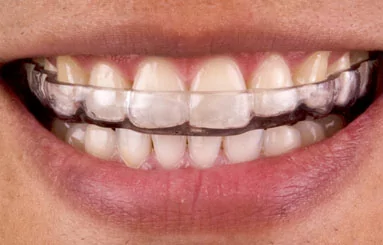Teeth grinding (or bruxism) is a common problem. Many people grind their teeth, and it can be a hard habit to stop—especially because teeth grinding often happens while you sleep, so you’re unaware of it. Occasional teeth grinding is usually harmless, but over time, it can lead to problems with your teeth and jaws. It can also cause headaches or pain in the jaw, especially when you first wake up.
So how can you reduce teeth grinding before it causes serious complications? There are a few things you can try.
Use a custom mouthguard.
A custom-made mouthguard can be a very effective treatment for bruxism, as it creates a physical barrier between the teeth and relieves pressure on the jaw. It’s important to note that only a custom mouthguard should be used. A custom mouthguard will be comfortable and effective, but an over-the-counter option will cause more problems than it solves.

If you think a mouthguard might help you with your teeth grinding, talk to your dentist about getting a custom one made.
Try Botox.
Botox can help with teeth grinding, as it relaxes the muscle that moves the jaw, thus reducing either the frequency or the severity (or both) of the grinding. This should not be seen as a cure for bruxism, but rather as a way to relieve the pain that grinding your teeth can cause.
Alleviate stress.
As the world continues to deal with a global pandemic, stress is unsurprisingly on the rise—as if it wasn’t common enough already. Stress can lead to teeth grinding, so learning to manage your stress might help solve the problem. Try some relaxation techniques (such as yoga or meditation) right before bed.
Avoid chewing on anything that isn’t food.
Chewing on pens, pencil erasers, plastic straws, and so on can train your jaw muscles to clench, which can lead to unconscious grinding. The same can be said for chewing gum, so if you’re dealing with teeth grinding, you might want to avoid that, too.
Avoid certain foods and drinks.
Caffeine and alcohol tend to make bruxism worse, so avoid those if at all possible. This includes foods that contain caffeine, such as chocolate.
Relax your jaw muscles.
Relaxing your jaw muscles will help you to not grind your teeth. There are some very simple ways to do this, such as placing a warm washcloth or compress on your jaw before bed, or placing the tip of your tongue between your teeth. If more serious intervention is needed, however, your doctor or dentist may recommend medications, such as muscle relaxants or medications to help with mental health struggles and stress.
Teeth grinding is a common but potentially troubling issue. If you’re dealing with some of the negative effects of teeth grinding, it’s time to talk to your dentist about possible solutions.